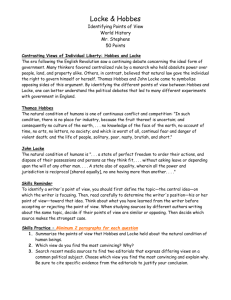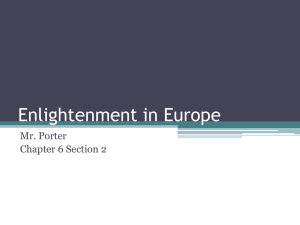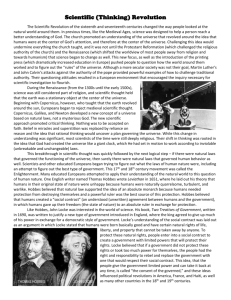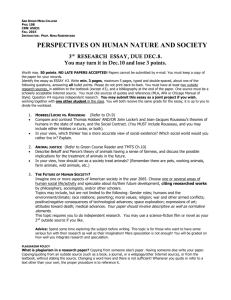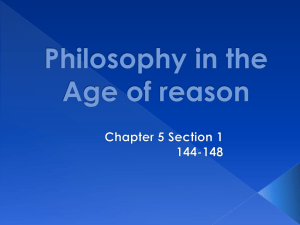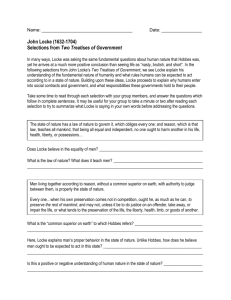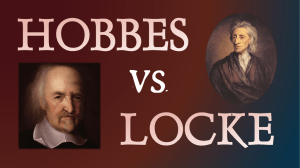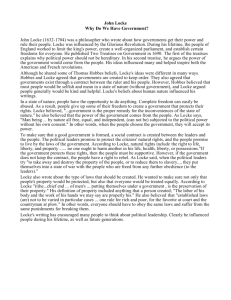Philosophy of Absolutism – Social Contract
advertisement
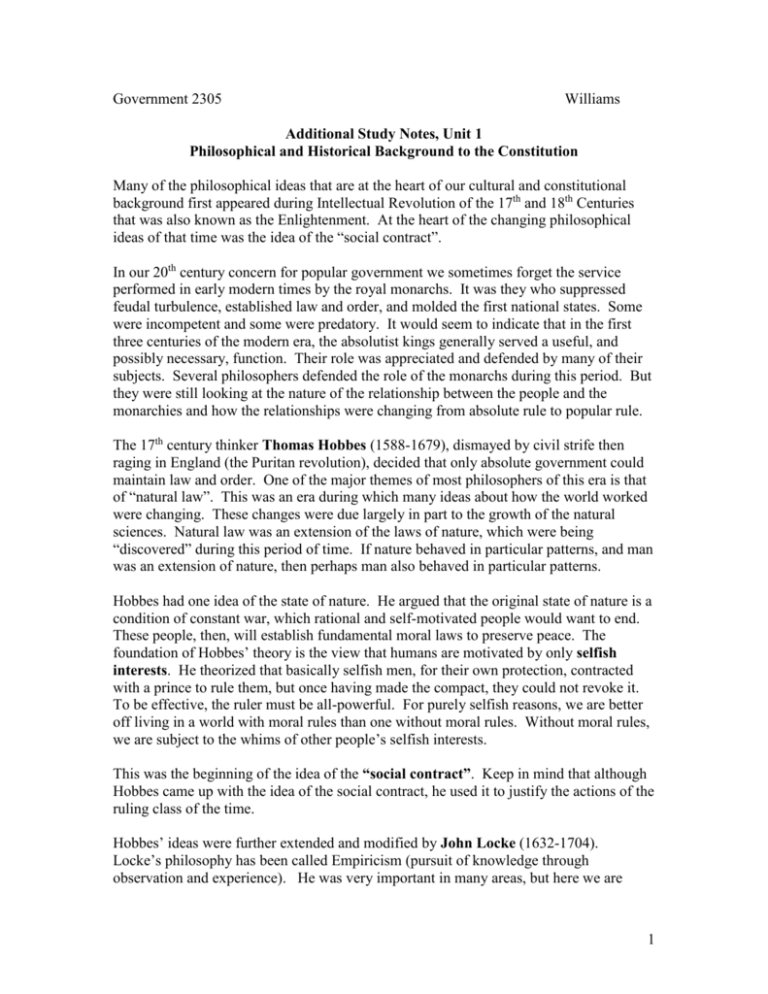
Government 2305 Williams Additional Study Notes, Unit 1 Philosophical and Historical Background to the Constitution Many of the philosophical ideas that are at the heart of our cultural and constitutional background first appeared during Intellectual Revolution of the 17th and 18th Centuries that was also known as the Enlightenment. At the heart of the changing philosophical ideas of that time was the idea of the “social contract”. In our 20th century concern for popular government we sometimes forget the service performed in early modern times by the royal monarchs. It was they who suppressed feudal turbulence, established law and order, and molded the first national states. Some were incompetent and some were predatory. It would seem to indicate that in the first three centuries of the modern era, the absolutist kings generally served a useful, and possibly necessary, function. Their role was appreciated and defended by many of their subjects. Several philosophers defended the role of the monarchs during this period. But they were still looking at the nature of the relationship between the people and the monarchies and how the relationships were changing from absolute rule to popular rule. The 17th century thinker Thomas Hobbes (1588-1679), dismayed by civil strife then raging in England (the Puritan revolution), decided that only absolute government could maintain law and order. One of the major themes of most philosophers of this era is that of “natural law”. This was an era during which many ideas about how the world worked were changing. These changes were due largely in part to the growth of the natural sciences. Natural law was an extension of the laws of nature, which were being “discovered” during this period of time. If nature behaved in particular patterns, and man was an extension of nature, then perhaps man also behaved in particular patterns. Hobbes had one idea of the state of nature. He argued that the original state of nature is a condition of constant war, which rational and self-motivated people would want to end. These people, then, will establish fundamental moral laws to preserve peace. The foundation of Hobbes’ theory is the view that humans are motivated by only selfish interests. He theorized that basically selfish men, for their own protection, contracted with a prince to rule them, but once having made the compact, they could not revoke it. To be effective, the ruler must be all-powerful. For purely selfish reasons, we are better off living in a world with moral rules than one without moral rules. Without moral rules, we are subject to the whims of other people’s selfish interests. This was the beginning of the idea of the “social contract”. Keep in mind that although Hobbes came up with the idea of the social contract, he used it to justify the actions of the ruling class of the time. Hobbes’ ideas were further extended and modified by John Locke (1632-1704). Locke’s philosophy has been called Empiricism (pursuit of knowledge through observation and experience). He was very important in many areas, but here we are 1 most concerned with his contributions to political thought. Locke argued that the state of nature is a pre-political, yet moral society, where humans are bound by divinely commanded natural law. A social contract is made between citizens who institute a government to prevent people from occasionally violating natural law. In his book, “Two Treatises on Government”, he argues that man has “natural rights”, and that among these are life, liberty, and property. To safeguard these rights, man voluntarily contracted to surrender a certain amount of his sovereignty to government. Government must be built on the consent of the governed, people must agree on who their rulers are. Government must also be a limited government; that is, there must be clear restrictions of what rulers can do. Indeed, the sole purpose of government is to protect “natural rights”. No government can violate the individual’s rights to these things, if it does the people who set it up can and should overthrow it. The idea that certain things were beyond the realm of government contrasted sharply with the traditional notion that kings had been divinely granted absolute rights over subjects. Here we begin to see the change from the justification of power by the monarchies, as defended by Hobbes, to one where the justification for governing comes from those being governed. Two limits on government were particularly important to Locke. First, governments must provide standing laws so that people know in advance whether their acts will be acceptable. Second, and Locke was very forceful on this point, “the supreme power cannot take from any man any part of his property without his consent”. To Locke, “the preservation of property was the end of government”. Baron de Montesquieu (1689-1755) was less a theorizer than a discerning student of history and a shrewd analyst of political systems. In his book, The Spirit of the Laws, he came to the conclusion that different types of governments are best suited to various conditions. For instance, absolute monarchy is best for countries of vast area, limited monarchy for countries of moderate size like France, and republics for small states like Venice or ancient Athens. Not only did he approve of Locke’s doctrine of limited sovereign, but he specified how it can best be secured – by a separation of powers and a system of checks and balances. The powers and functions of government should be equally divided among kings, lords, and commons, each on being checked by the other two. His model was converted into executive, legislative, and judicial branches in the American system. Also during this era, a lot was changing in the thought of how economic systems functioned. Some French thinkers began to teach that economics has its own set of natural laws, that the most basic of these laws is that of supply and demand, and that these laws operate best when commerce is freed from governmental regulation. This doctrine came to be known as that of laissez faire (or free trade and enterprise). The chief formalizer of the theory of laissez faire was Adam Smith, a Scottish professor of philosophy who spent time in France. His “Wealth of Nations” was published in 1776 and has remained the bible of laissez faire economics ever since. This is the basic economic philosophy that has dominated our culture for over two centuries. 2 As we can see, a lot of social changes were occurring during the period leading up to the American Revolution. This revolution was a fairly complex movement, more appropriate for history classes, but some things we should know here. It was not a revolution for social changes! It was a very conservative revolution in that it set out to keep things that the colonists felt were their rights that were being denied to them by the British. Foremost, in the century and a half prior to 1776, American society had become fundamentally different than British and European societies. America was geographically distant from Europe, and this was a major factor. The size of the American continent also was a factor, offering many opportunities to those brave enough to venture into the new frontiers. There were also economic differences from Europe. The colonial economy was a diversified agricultural economy, and had grown to be independent of Britain. There was the growing development of merchants and manufacturing, beginning of trade with other nations (mostly raw materials). The Colonies were not totally self-sufficient, but they were not totally dependent on Britain and Europe. American entrepreneurs were intent on protecting and expanding their own interests, and wanted to do so more and more without constraints. There were also growing social differences from Europe. Almost none of Europe’s aristocracy had immigrated to America. American aristocracy was based on wealth rather than on blood. It was possible for an enterprising and lucky man of the lower classes to attain aristocratic rank by amassing a fortune. The frontier also offered an opportunity to men of humble origin, who resented aristocratic dictation, to achieve rank and privilege. Finally, there were the political differences. Although each colony had its own government, a common pattern had developed by 1776. Each colony had a governor who represented the authority of the British crown and who was usually chosen by the king. Each colony (except Pennsylvania) had a two-house legislature. The lower house was elected by property owners, while the upper house was usually appointed by the British king or by the governor. Governors did have power of veto over legislature, but did not exercise this often for fear of political reprisal. The court system was patterned after British courts and had incorporated the tradition of English common law, which included the right to a trial by a jury, and due process of law. The colonial governments had grown increasingly accustomed to a wide range of freedom, and the colonists increasingly felt that it was their right to decide their own fate. Keep in mind that the most Americans were still very much Englishmen, and still closely attached to their European tradition. The relationship between the colonies and England began to change with a modification in English policies after 1763. On the English side, they had just finished fighting the Seven Years’ war (also called the French and Indian War) in America. It had been marked by a refusal of the Americans to raise troops and money, their blatant trafficking with the enemy (France), and by open defiance of the royal authority. This made 3 England realize how inadequate her system of control over the colonies was. This also left England with a huge debt, incurred in part to save the Americans from the French and the Indians. In the minds of the English taxpayers it was time for the ungrateful colonials to pay up. From here, you should be able to rely on your textbook for information leading up to the Revolutionary War. Keep in mind we are not too worried about the details of the war (they are usually covered in American history classes). We are more concerned with the development of the colonial system of government, first with the Articles of Confederation, then the Constitution. Sources: Russell, Bertrand: A History of Western Philosophy, Simon and Schuster, 1945. McLlelland, J.S.: A History of Western Political Thought, Routledge, 1996. 4
